Spring Bleak
I am at the start of the long haul back to Ma from MI (so many “M” states!) I taught a workshop on Deflected Doubleweave to the Michigan Weavers Guild from Thursday to Saturday afternoon, and then did a presentation for the guild at large after lunch on Saturday.
 Because it was my youngest son’s school holiday,we decided to take a family road trip up through Rochester . . . Buffalo . . . Cleveland . . . Toledo . . . and on to Detroit.
Because it was my youngest son’s school holiday,we decided to take a family road trip up through Rochester . . . Buffalo . . . Cleveland . . . Toledo . . . and on to Detroit.
These are my observations: March is a pretty grim month north of the Mason Dixon from MA to MI. 
The Toy Hall of Fame in Rochester is fabulous although my husband and I seemed to have a much better time than our cringing 14-year-old.
It seems that the stereotype of midwesterners – that they are down-to-earth, hard-working and friendly while also being pretty startlingly (to me of the “fantastic”, “fabulous”, OMG) un-hyperbolic.
We drove into Southfield, the suburb of Detroit where I would be teaching late Wednesday night and I scrambled to unload and make sure I had everything I needed for the workshop. Our “suite”, that was to house the three of us, turned out (shame on those fish-eye room photos) to be a quite comfy king bed with a small pull-out couch jammed up next to it so that when my son was asleep, I had to climb over my husband to get out of bed.
The workshop was great for me, I had 9 students (ten originally, but one loom remained naked) of varied experience but all extremely focussed, hard weaving and sharp. I had to stay on my toes with this bunch, one of whom was a past president of HGA, another the Weave Master at Henry Ford and another a Masters candidate in fiber/fabric analysis PLUS an artist, math professor, editor . . . and more . . . whew! No sleeping on the job.
All but two weavers were on table looms, and I had provided lift plans for this class. My poor students at NEWS had to create their own. I did very graciously include several mistakes in order to keep the MWG on their toes – remember Inspector Clouseau, “everything I do is planned!”
It was a great treat to hang out with fellow obsessives who like to talk endlessly (and rivetingly) about velvet weaving, jacquard looms, historical textiles, fabric analysis, yarn sources, etc. all the while wearing hand-woven accessories and garments that you can stare at and touch without getting slapped or arrested.
After the workshop I presented a program on Hand-woven Aprons. Everyone was nice and attentive and sat through what may have been sewing 101 to them, but I did get quite a response when I donned my Wonder Woman apron that Barbara Hurley had given me. Nothing like cartoon cheesecake to liven up an Apron Program.
We stayed in Niagara, not in, but across from “A Bit O’ Paris” motel. There were so many down-at-heels or defunct motels from the romantic getaway Niagara Falls of yesteryear that it made me sad. We were laughing because one of the even more down-at-heels motels had a big sign “Used Cars/Rooms” and my husband said, Welcome, We’ll murder you and take your car!”
This morning we stopped by the freezing and frozen Falls. As you can see the teenager is not allowing the majesty of the Falls to bring him out of his, “It’s the crack of dawn, we got in after midnight, it’s freezing. Okay – it’s beautiful! ” funk. This was my first time seeing Niagara Falls, and despite the fact that everything my son was complaining about was true, it was soo beautiful. The spray had frozen on all the surrounding trees, and the mist and choppy water and icy stone formations were awe inspiring.
Onto the next weaving adventure. I will definitely be teaching a class on Moving Threads at Vav Stuga starting September 14. I think it is going to be really interesting. We have expanded the theme of deflected double weave to include some amazing drafts from old Swedish weaving books. There will be 8 total projects with each student able to weave five. All the projects will use the wonderful Swedish yarns, linen, wool, cottolin, cotton and combinations and they will all involve moving threads and be finished, usable pieces. I will post pictures of some of the prototypes soon. I just have to get out of the car and onto my loom bench.
Okay, these are the questions that were posed (or I thought of) during this workshop that need consensus, and not the “it depends” but some parameters:
Does one really need to feed yarn from tubes off the tubes horizontally or is it one of those “smarty pants” adaptations that don’t make a difference 99% of the time. I always do it, and have many plastic salad containers with holes and knitting needles to prove it, but necessary or not?
In the Swedish tradition the lease sticks are left on the loom while weaving. I have always done it – even on my jack looms until recently when Madelyn van der Hoogt said that doing it is defeating the careful engineering of the depth of the loom and the shed. But is it another thing that almost never matters one way or another?
What about sleying selvedges more tightly to control beat and give a nice selvedge edge. I rarely do it, but when I have I get smiling selvedges. The dense sett makes the edges almost warp-faced and so they take-up more. Any answers?
Keeping a wound warp under tension or chained? This may be a “it depends” because I put tight chokes every yard, so there isn’t much danger of tangling, but I never chain or kite stick or anything. I gently drop the warp into a plastic salad container (I have a lot of these) until I need it. I rarely have a problem warp, but I rarely weave with yarn finer than 20/2 in the warp. SO?

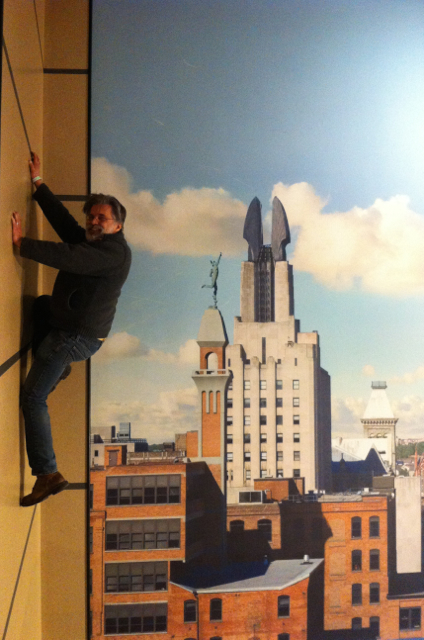
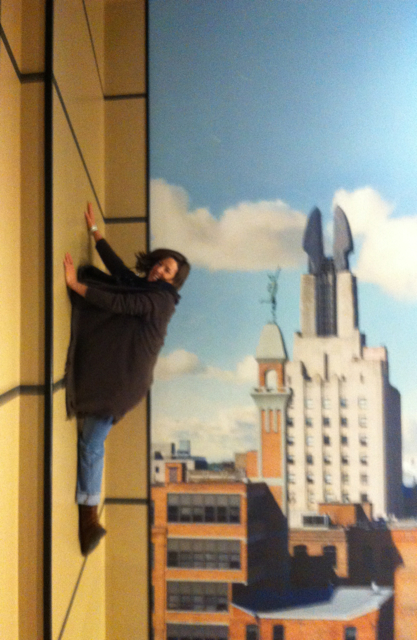

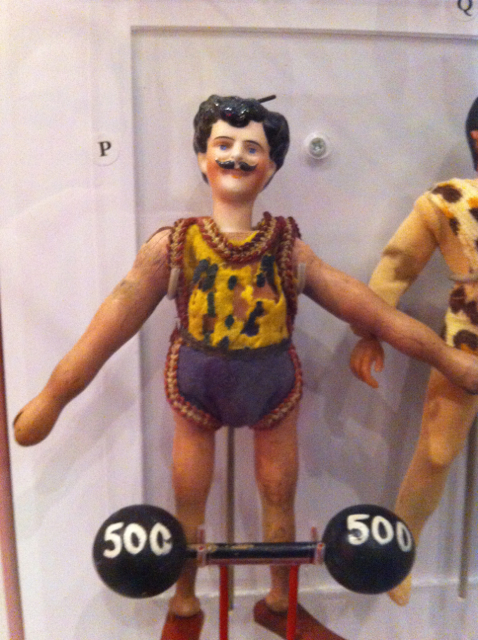

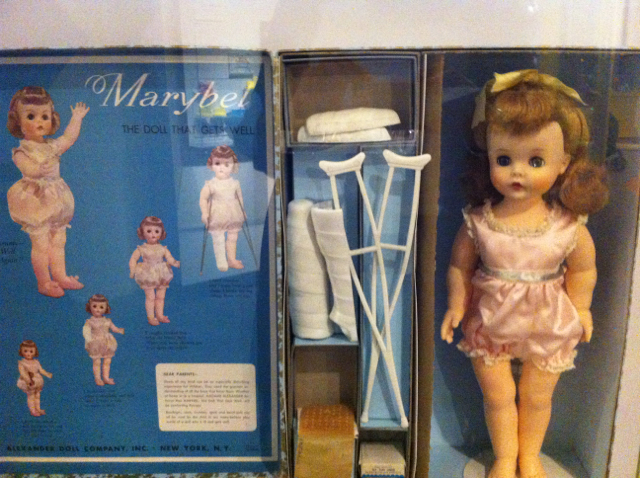
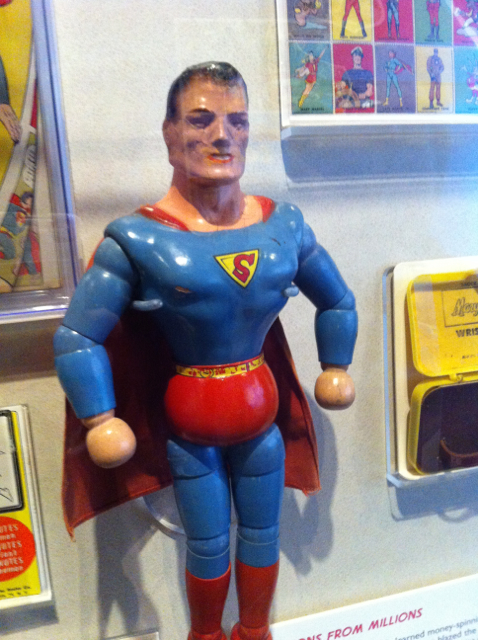
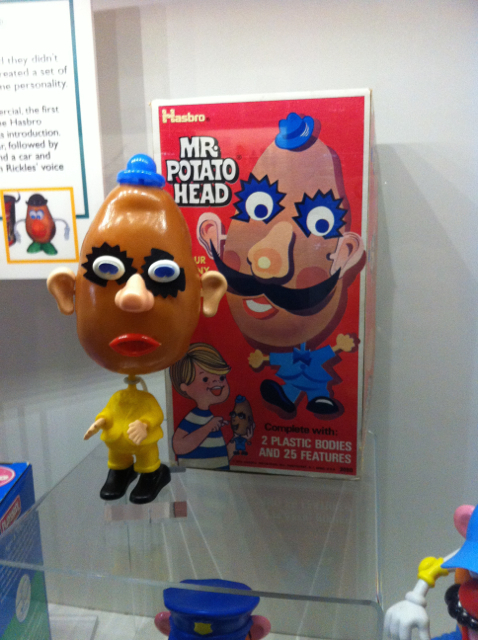
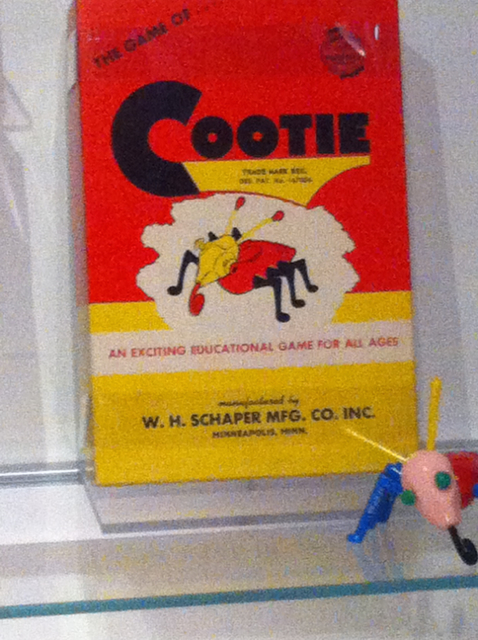
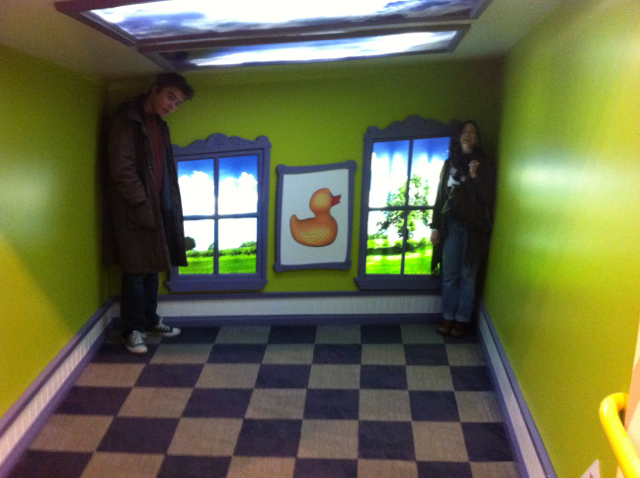
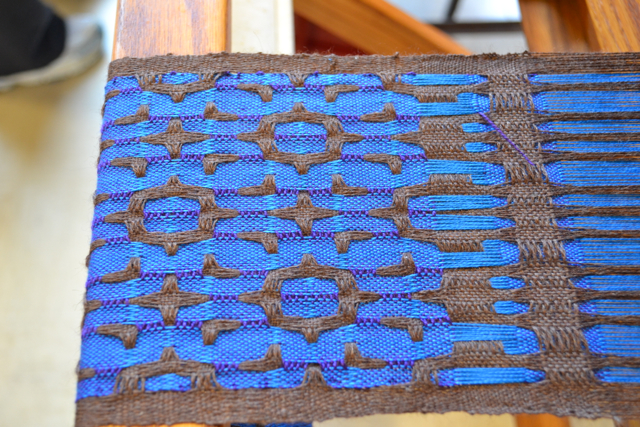
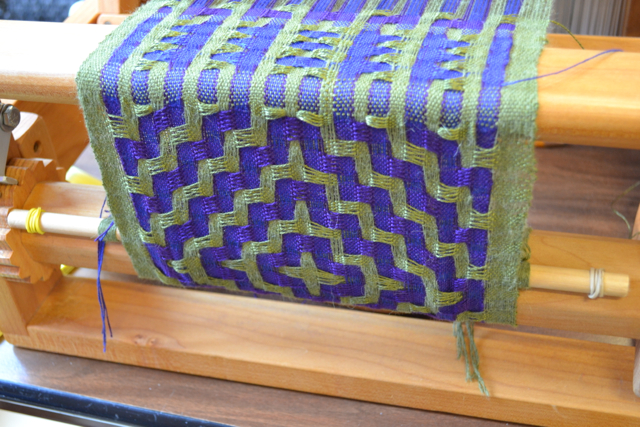
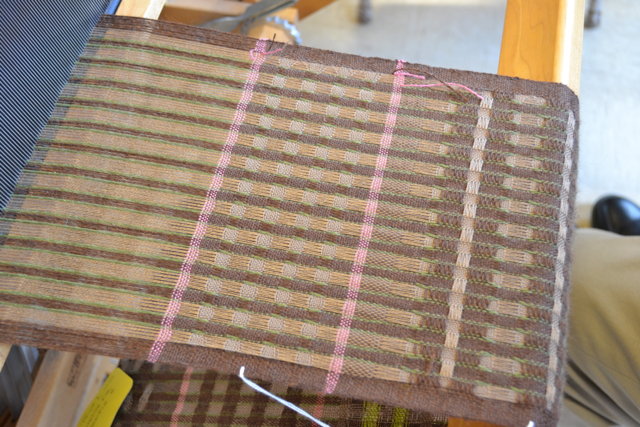
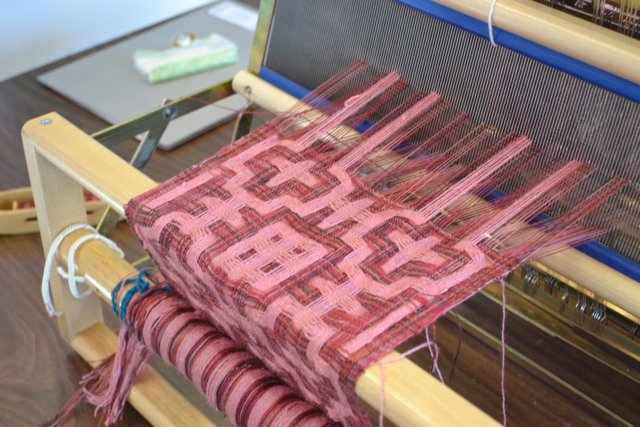
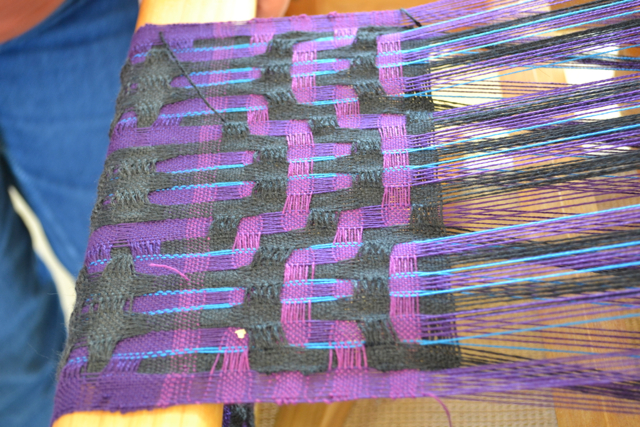
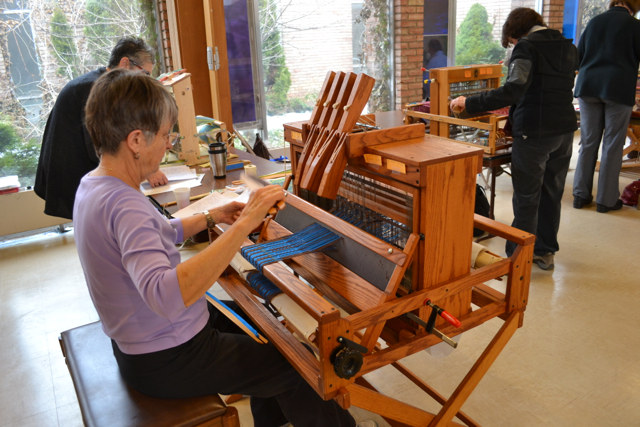
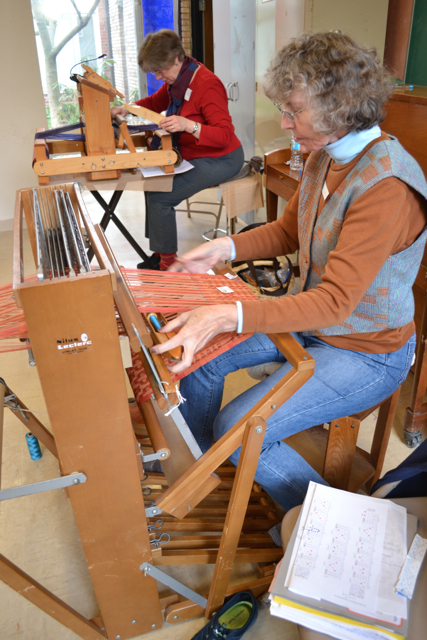
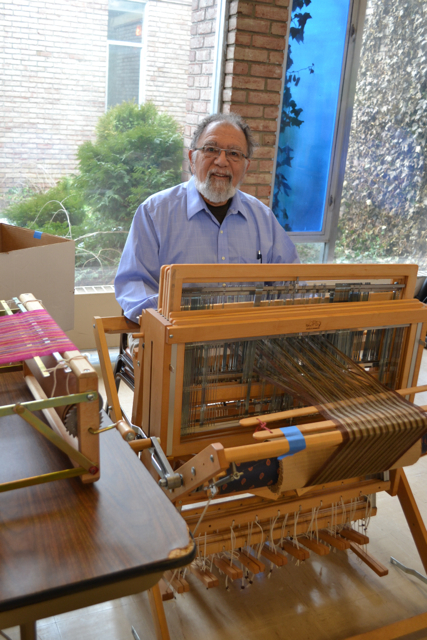

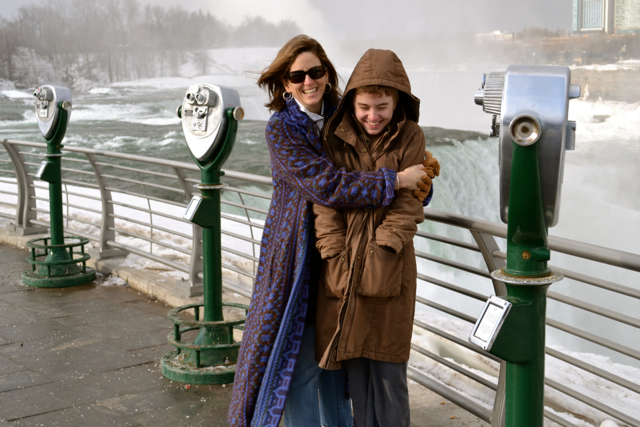
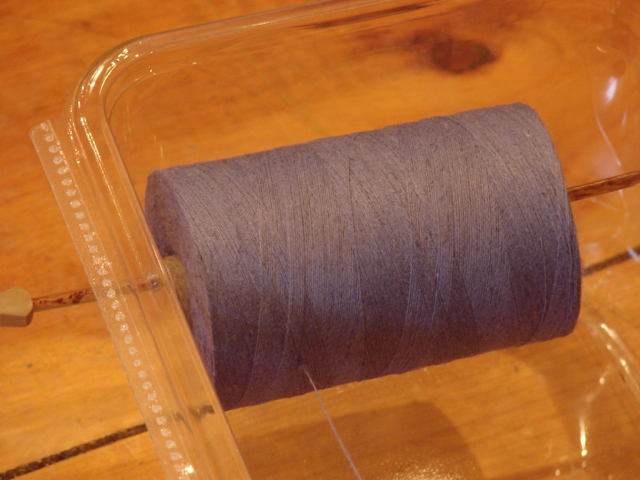
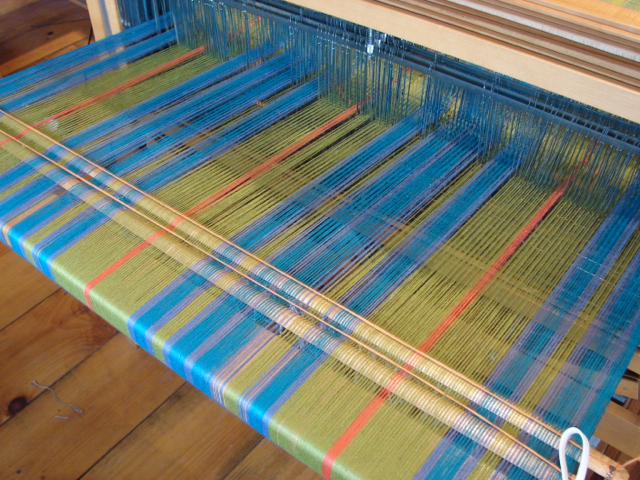
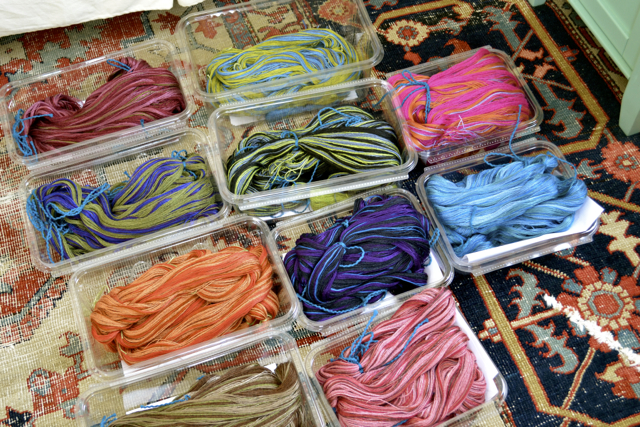
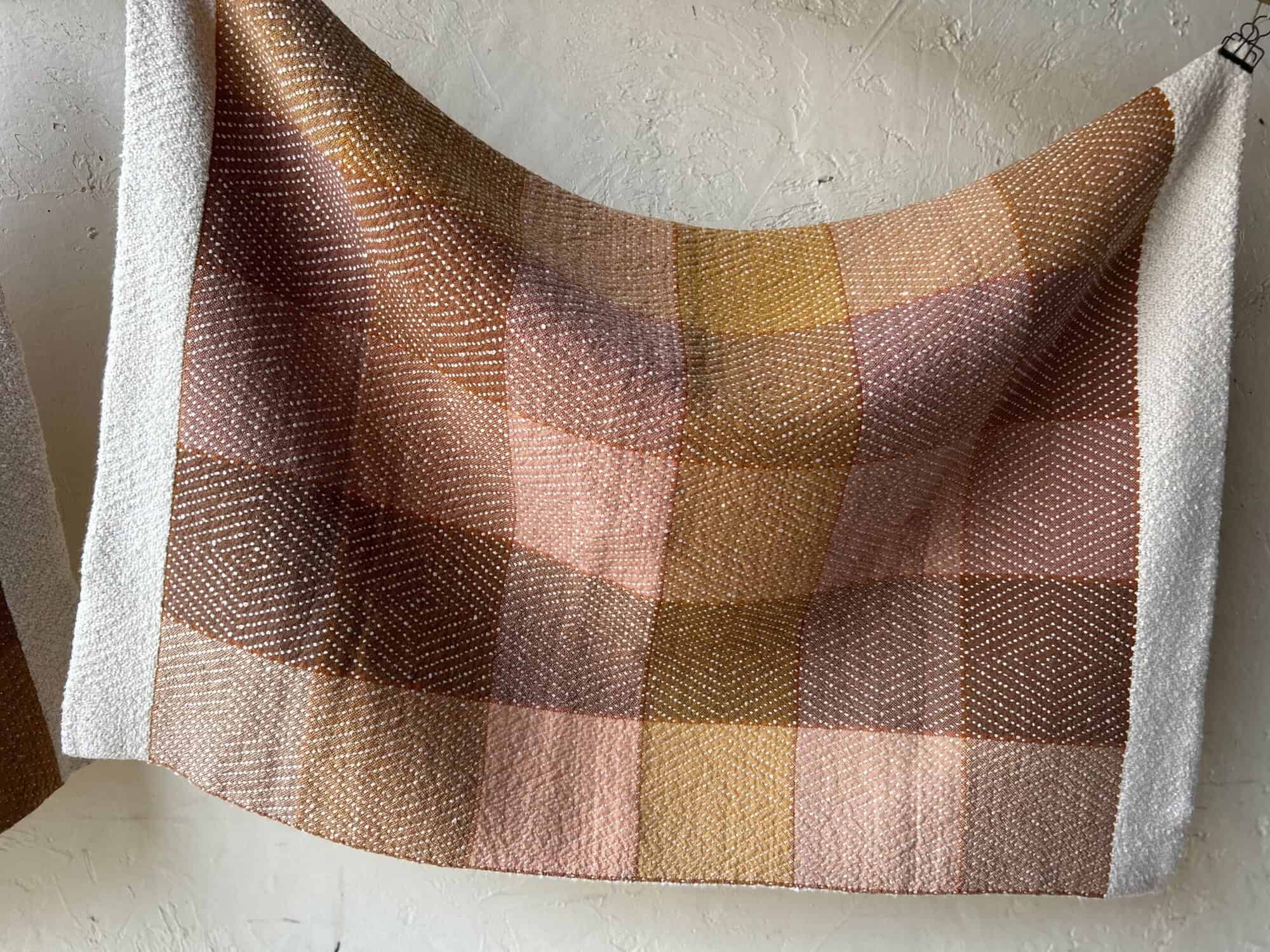
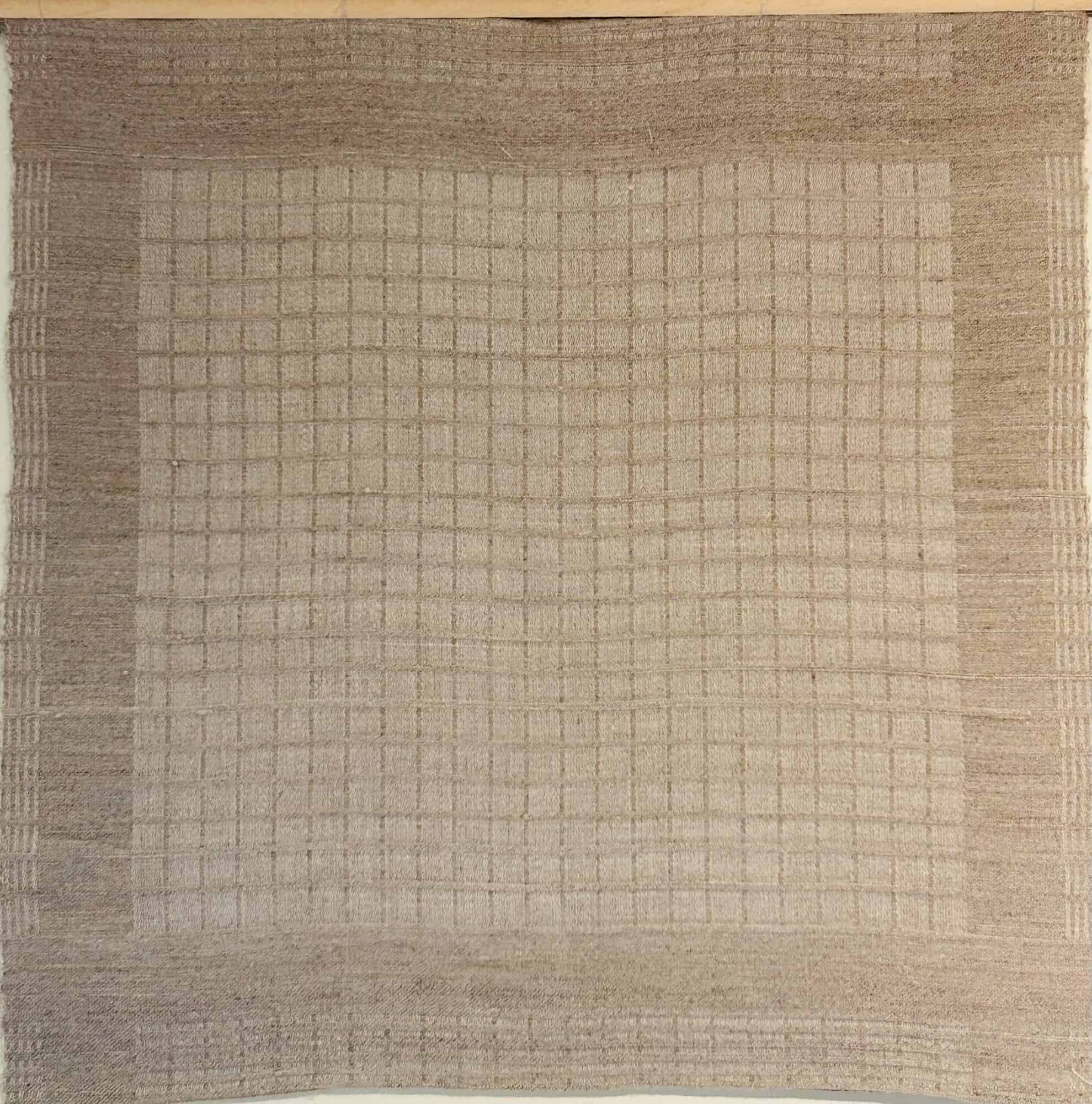
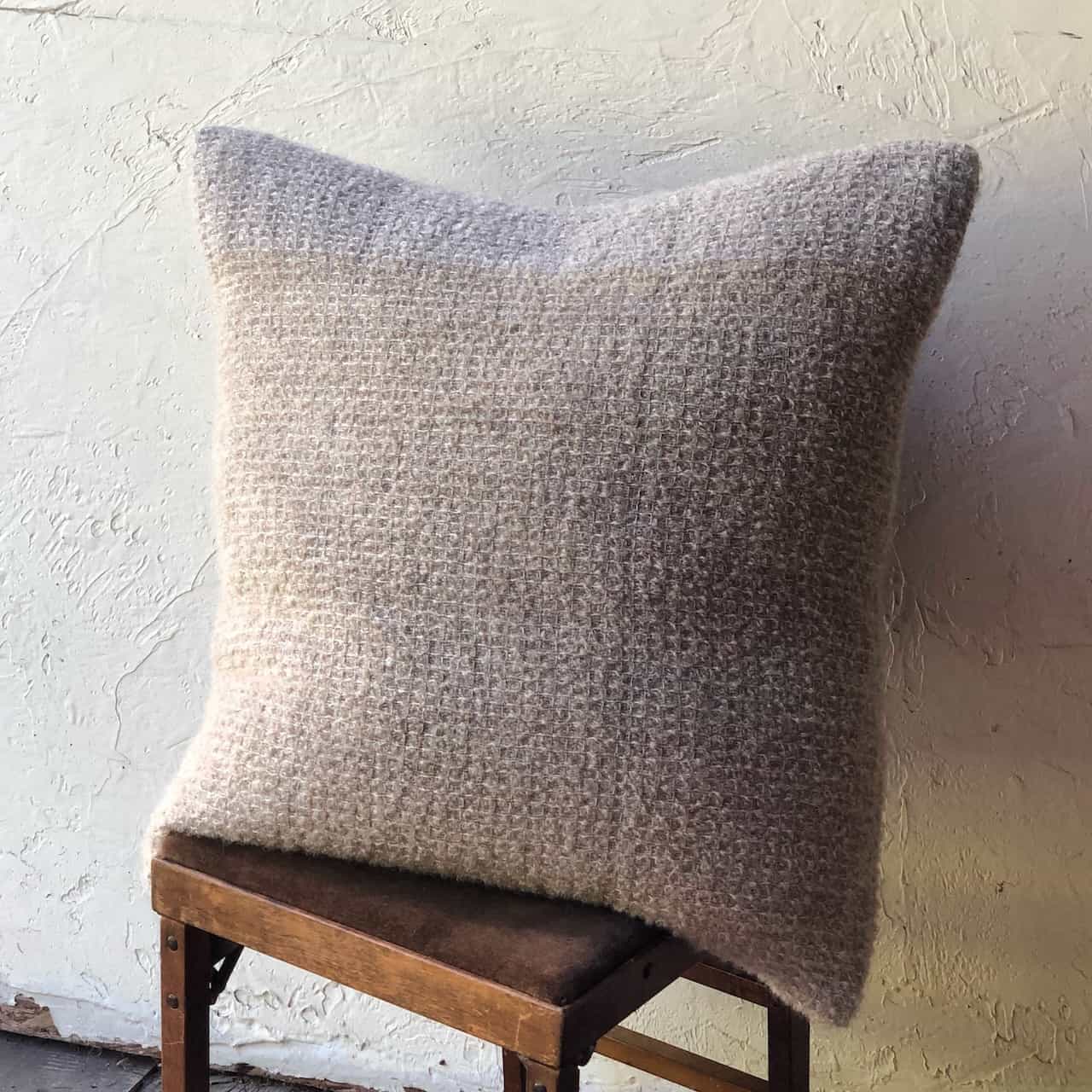
Valerie
OMG! (at the risk of being hyperbolic 😉 if we had known you were “in” to toys, we would have sent you to Marvin’s Marvelous Mechanical Museum! http://marvin3m.com/
You’ll just have to come back.
BTW, while finishing my samples I decided to use red for some of the plain weave (on the black, amethyst, ming warp) WoW!! It looks pretty neat. I won’t be able to get around to a blog post for a week or so, though. So you’ll have to wait.
Great workshop, Lisa. Thanks.
Elisabeth Hill
Hi Valerie,
I didn’t know you were Fiberewetopia?? I added your blog to my blogroll, so I will visit regularly now and get to see the scarf come to fruition.
marlene toerien
Hi Elisabeth, I think the saying there is more than one way to kill a cat is viable for all of the above, except the horizontal position of tubes, as it definitely make a diference to your weft/warp yarns, and it winds off easier without getting stuck on the little end of the tube sticking out. I wind warps as I need it, but do chain it as I don’t have a warping valet, and I put all my warps on by myself, the chains give me better control over the warp.
Elisabeth Hill
Hey Marlene,
I guess I knew that “more than one way to skin a cat” or it depends . . . is actually the answer, but it is a comfort to think that there are some definites . . . like good tension is good? Any others:))
marlene toerien
HI to explain it may be a bit better if you put the tube/cob horizontal your twist stay balanced, if you have it upright it can either twist more or untwist and then your warp/weft is uneven.
Elisabeth Hill
Hi Marlene,
Thanks for the conversation . . . and yeah – I understand the reasoning, but twist is added or removed when you wind off of cones too, but no one ever tries to orient cones horizontally – do they? I guess my question is more about how these adaptations are set up either to deal with specialty yarn issues or vast yardages when added twist can make a difference, and have been taken by handweavers as “must dos” when they are more, “Eh, that will probably work too.” The only other reason that many of these stay in the handweaving culture (I think) is that they make weavers aware of what’s going on. When you tell a new weaver to orient their tubes horizontally so as to minimize added twist – you may be opening their eyes for the first time to twist in yarn and how it could effect their cloth. . . . what do you think?
marlene toerien
I think the answer to cones are that they are wind in the right direction, so when you unwind them you don’t get extra or less twist than it should have, so you need to wind cones in the correct direction when you do it at home! I quite agree with your comment about new weavers. I love to work with them to see that moment in their eyes when everytihing they hear are starting to make sense to them.
Debbie
Great post! Everything from a Gandhi doll, to frozen waterfalls, to beautiful Doubleweave and puzzles!
My 2 cents:
End of tube vs unwind from below: the issue is added twist from unwinding from the end. Usually it doesn’t matter. With very thick threads, a little more or less twist can make a big difference, since there are not many twists per inch to begin with. Yarn that is unbalanced or wiry may also have problems from the end.
Lease sticks, if they work for you, use them. I do. I probably wouldn’t on a loom with a really short shed.
Warp storage. Most warps work fine with being stored loosely. If you get into fussy threads like highly twisted yarns, undegummed silks, metallics, etc. I’ve found storage under tension to be important.
Elisabeth Hill
Hi Debbie!!
Great to hear from you – and I appreciate the 2¢. Your perspective is a good one because you are a weaver who works with “unruly” materials and who may have to be more of a yarn disciplinarian than most. BTW I am about to send you a contract to teach at our guild, and I am stoked!
Debbie
Awesome. I can’t wait!
Claire
My answer to all the above questions is ‘I don’t know’ – helpful aren’t I! I can sorta see MvH’s point about the lease sticks. I had just had a quick scan of Ulla Cyrus’ Manual of Handweaving she leaves the lease sticks in but I couldn’t find an explaination of why.
Elisabeth Hill
Hi Claire,
Thanks for the think. I imagine that the Swedish loom users leave them in because, “why not!” they have a mile between the shafts and the back beam, and the leases are always useful if you need to correct a threading error or re-thread. That’s why I always left mine in on my jack looms. Again, I think they compromise the shed only rarely, but MvdH also says that they stress the warp . . . I always thought that they added to my nice tension . . . live and learn.
Kerstin in Sweden
From the Swedish (native!) perspective – better late than never?
Horizontal vs vertical tubes: when I went to weaving school (now some 30+ yrs ago) there was no theorizing (is that a word?) on twist. There was also no (horizontal) spool racks. But we were always told to stand the tube so that the yarn came off it in the … (I could never remember, not even then!) direction. (Widdershins, or anti-clockwise, I *think*) A friend of mine had a theory that the mill put in less (or extra, as I can’t remember the “must” direction) twist in the ply, so that it would be “corrected” while warping. …which leads up to: another weaving myth. In my experience, it is more important that all spool are in the *same* direction… but it might be my own weaving myth?
Lease sticks: yes, we were told to always leave them in. (A popular explanation is that it is so much easier to find a broken end – myself, I usually notice the broken end at the fell, trace it back to its heddle, and go on from there.) However, lease sticks can be helpful for us with “miles” of warp behind the heddles: bringing them forward helps with sticky warps, as they alter the angle of the shed. – on the whole, I think lease sticks are left in place because “that is the way it SHOULD be done”.
On selvages: personally, I never sley tighter. And: I (and many, many other Swe weavers) had never even heard about floating selvages until the internet… (and, even though I went on the ‘net in ’96, I still haven’t tried them)
Kerstin (who asks you: please don’t skin cats! I’m sure mine would not appreciate it…)
Elisabeth Hill
Hi Kerstin,
So glad to hear from a native, and good info! I always conceived of the vertical positioning as a “it doesn’t really matter for handweavers because the warps are relatively short” but the idea that mills have compensated for weavers removing twist is fascinating . . . another variable to mull over as I get on with it in my fairly haphazard way:) No cat skinning here – I have no fears for my beasty – he is more threatening to the skins of others than visa versa.